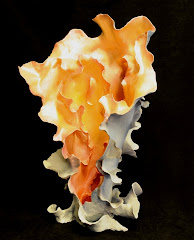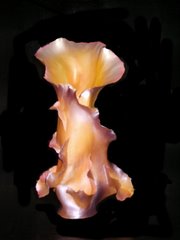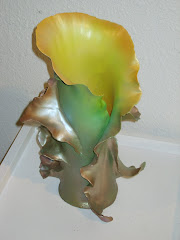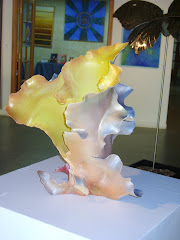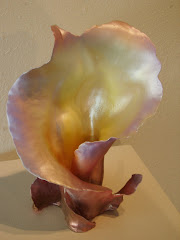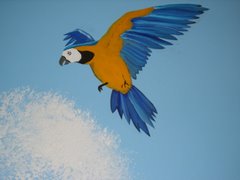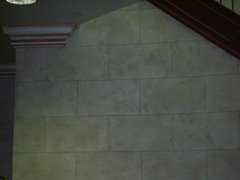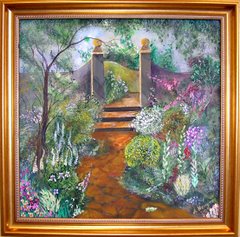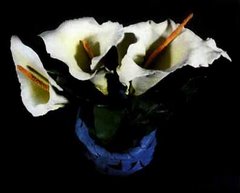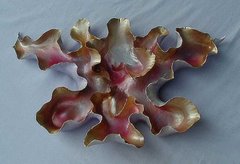Wednesday, December 31, 2014
Composition and background
Regarding " background," if you look at the "solid" or mottled backgrounds in the works of great painters, it becomes apparent that these are not random splotches of color or brush strokes. There is a patterning in them that "recognizes," if you will, the structure of the main composition or subject. In fact, it can be argued that these subtleties, together with the alignments in the "main" part, the one you think you are looking at, serve very much as lines of perspective and of motion, such as might be more obvious in an architectural drawing or a city-scape. The subtlety of these suggested lines, along with their efficacy in directing the feeling of the eye may bear great importance on the success of the painting as a whole.
The broken open heart
Rumi said that you have to keep breaking your heart until it opens. That's because the heart you think you have, the one they told you is "yours," isn't. When that one breaks, you realize with your feelings and your mind that you ARE the Heart, wearing what you thought was you. Then you see that the depiction of the Sacred Heart is a self portrait; you are looking at yourself in the mirror.
Sunday, December 28, 2014
religion? Politics?
Few people give received beliefs a second thought, many--or all--of which were installed before the so-called "age of reason." I.e., they are pre-verbal and pre-cognative. More intelligent people tend to be more reflective, or at least make more effective use of their mirror neurons. Not that everyone can't, but the emotional bonds to the "pre-" stuff is so strong in many that they never choose to look, feeling their sense of self threatened. More mature individuals seem to be able to divorce their sense of self from any thought train, cluster or habit. It is a HUGE advantage to be able to do that.
The ability to separate sense of self, to abstract it, even to, and especially to the point of identifying as awareness itself, brings an incalculably important transformation to bear on one's life experience. And while this used to be an arcane and esoteric feat, it is nowadays accomplished somewhat more simply, as there is not nearly the religious and social danger of perusing it as once was, say in Catholic dominated culture before the Reformation.
The ability to separate sense of self, to abstract it, even to, and especially to the point of identifying as awareness itself, brings an incalculably important transformation to bear on one's life experience. And while this used to be an arcane and esoteric feat, it is nowadays accomplished somewhat more simply, as there is not nearly the religious and social danger of perusing it as once was, say in Catholic dominated culture before the Reformation.
Saturday, December 27, 2014
About reading
I never had the "childish" notion that reading isn't "cool." Rather the opposite. Reading is and always has been a vital connection with the ideas that interplay to appear as the world we live in, and how we live in it. Both non-fiction and fiction apply here, as they deal with the outer and the inner worlds, the worlds of measuarability and of meaning, and their connectivity, or lack of it.
My personal list includes books on origins and foundational ideas. This is because if I'm going to be a functional man, not just an entertained one who consumes, it is necessary and vital to have a working knowledge of the paradigms by which people have and do live their lives. It doesn't mean I agree with them, it just means that I can account for them in my own view in terms of making observations and decisions. After all, you cant think about something you don't have an idea of, and therefore don't understand or even perceive if it is in front of you. And that is how we repeat history, or make stabs at re-inventing the wheel, yes?
The most vital area, I feel, of reading and practical inquiry, is into how we ourselves work, as physical and mental creatures. It is pretty clear to me that most folks don't do much self inquiry of any sort, especially of the sort that leads to the possible tranformations of the awareness itself. In fact, I'd hazard that beyond some drug use of some kind, the usual individual may not even be aware of some of the possibilities of their own nature. And I'm definitely not talking about hingy-bingy new age stuff. Neither am I talking about prayer, no matter how sincere,save in one particular instance.
Another vital area, hugely neglected, is the history of our race. For instance, few know about the actual nature of money, how we got to the ideas hinted at in the Constitution, especially the separation of church and state, and the vast and complicated history of our involvement with resources and their utilization and the consequences we have imposed on ourselves and our children through that. And there is, of course, that astonishing wonder of the sheer immensity and complexity of this planet and its origins and context.
I don't think there ever will be enough of reading and sharing. Also it is my observation that I have seen more drastic changes in understanding in my book club than I have in any church, or anywhere else, save one. We are currently going through Ken Wlber's "A Brief History of Everything." I can't recommend it enough, along with a few others. Why? Because to be a Man in the generic sense, and on of the greatest freedom and effectiveness, it is vital to know oneself. And ultimately, one's "self" cannot be separated from all that came before it and now surrounds it as the flow of time and its elegant turbulence.
My personal list includes books on origins and foundational ideas. This is because if I'm going to be a functional man, not just an entertained one who consumes, it is necessary and vital to have a working knowledge of the paradigms by which people have and do live their lives. It doesn't mean I agree with them, it just means that I can account for them in my own view in terms of making observations and decisions. After all, you cant think about something you don't have an idea of, and therefore don't understand or even perceive if it is in front of you. And that is how we repeat history, or make stabs at re-inventing the wheel, yes?
The most vital area, I feel, of reading and practical inquiry, is into how we ourselves work, as physical and mental creatures. It is pretty clear to me that most folks don't do much self inquiry of any sort, especially of the sort that leads to the possible tranformations of the awareness itself. In fact, I'd hazard that beyond some drug use of some kind, the usual individual may not even be aware of some of the possibilities of their own nature. And I'm definitely not talking about hingy-bingy new age stuff. Neither am I talking about prayer, no matter how sincere,save in one particular instance.
Another vital area, hugely neglected, is the history of our race. For instance, few know about the actual nature of money, how we got to the ideas hinted at in the Constitution, especially the separation of church and state, and the vast and complicated history of our involvement with resources and their utilization and the consequences we have imposed on ourselves and our children through that. And there is, of course, that astonishing wonder of the sheer immensity and complexity of this planet and its origins and context.
I don't think there ever will be enough of reading and sharing. Also it is my observation that I have seen more drastic changes in understanding in my book club than I have in any church, or anywhere else, save one. We are currently going through Ken Wlber's "A Brief History of Everything." I can't recommend it enough, along with a few others. Why? Because to be a Man in the generic sense, and on of the greatest freedom and effectiveness, it is vital to know oneself. And ultimately, one's "self" cannot be separated from all that came before it and now surrounds it as the flow of time and its elegant turbulence.
Saturday, December 20, 2014
In the dark?
I worked at the OpSci center of the UofA many years ago. The staff photographer had his facilities in the building, and was gregarious at sharing things about himself. One thing he did, I found out, was that he asked people if they had any idea of what his life was like. Of course, many of us said no. If anyone inquired as to what it might be like, his response was the same in each case. He conducted them to his dark room, told them to go in, said he'd be right back, and locked them in with the lights off.
When it came my turn to be in the dark, I found myself in a state of curiosity. I looked at my many optic sensations, listened hard to fans and vague through-the-wall sounds, and payed attention to information from my nose. I experimented with the difference between looking at trying to see with my eyes, and seeing as one does when off riding a thought train. It was altogether interesting, a sort of sensory deprivation chamber, and many varieties of thoughts and sensations came up. It was a sort of involuntary meditation, if you will. In any case, I found nothing disturbing about being there, even found a kind of confidence.
When the door opened, it was the photographer who seemed upset. "What's with you?" he asked. "Almost everyone I do that to is pounding on the door in a few minutes at the most!" What seemed a brief time to me had been about 25 minutes on the clock. He actually had gotten worried that I had fainted, or something. In fact, I was just comfortable with being with myself, and found no threat in darkness, at least knowing that I wasn't in a jungle I had no skills for.
But I came to realize that many people do find that they are unskilled in the jungle that must be, I speculate, made from the suggestions of their mind, if they are alone in the dark, or alonein a room without media, or if there is just silence when others are around. There is a disturbing, to me, lack of comfort that people have about themselves, and what might happen if they were left alone with what their mind puts up for consideration. It is, it seems like a chemical dependency to have a constant stream of stimulation. And perhaps some do very extreme sports to break into a space where there is enough focus required that the wide band stimulation narrowed to the moment where a single movement stands between life and death.
That seems like a temporary version of the single movement away from identifying with personal self. It certainly must have benefits, but seems to rely on physical and somato-chemical conditions. Perhaps actual dependency addicts have this in common with extreme sporters in a way. I don't know. But I do know that the precious moments of alone silence are jewels in my lap. And those don't seem capable of being shared in telling, save to someone who has their own.
When it came my turn to be in the dark, I found myself in a state of curiosity. I looked at my many optic sensations, listened hard to fans and vague through-the-wall sounds, and payed attention to information from my nose. I experimented with the difference between looking at trying to see with my eyes, and seeing as one does when off riding a thought train. It was altogether interesting, a sort of sensory deprivation chamber, and many varieties of thoughts and sensations came up. It was a sort of involuntary meditation, if you will. In any case, I found nothing disturbing about being there, even found a kind of confidence.
When the door opened, it was the photographer who seemed upset. "What's with you?" he asked. "Almost everyone I do that to is pounding on the door in a few minutes at the most!" What seemed a brief time to me had been about 25 minutes on the clock. He actually had gotten worried that I had fainted, or something. In fact, I was just comfortable with being with myself, and found no threat in darkness, at least knowing that I wasn't in a jungle I had no skills for.
But I came to realize that many people do find that they are unskilled in the jungle that must be, I speculate, made from the suggestions of their mind, if they are alone in the dark, or alonein a room without media, or if there is just silence when others are around. There is a disturbing, to me, lack of comfort that people have about themselves, and what might happen if they were left alone with what their mind puts up for consideration. It is, it seems like a chemical dependency to have a constant stream of stimulation. And perhaps some do very extreme sports to break into a space where there is enough focus required that the wide band stimulation narrowed to the moment where a single movement stands between life and death.
That seems like a temporary version of the single movement away from identifying with personal self. It certainly must have benefits, but seems to rely on physical and somato-chemical conditions. Perhaps actual dependency addicts have this in common with extreme sporters in a way. I don't know. But I do know that the precious moments of alone silence are jewels in my lap. And those don't seem capable of being shared in telling, save to someone who has their own.
Subscribe to:
Comments (Atom)

